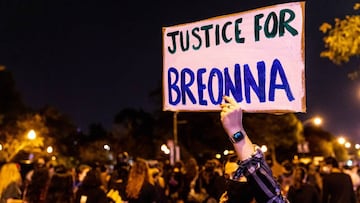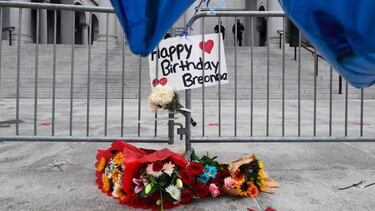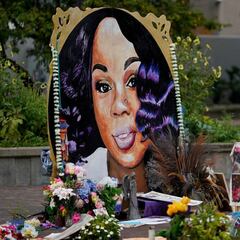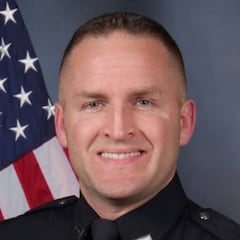Breonna Taylor case: what is ‘wanton endangerment’ in the first degree?
A grand jury in Louisville handed down the charge to one of the three officers involved in the killing of Breonna Taylor Wednesday.

It’s the charge that the Louisville, grand jury handed down to one of the three officers involved in the killing of Breonna Taylor Wednesday, but what is Wanton Endangerment, and what will it mean for Brett Hankison if convicted?
The fallout from the decision has sparked a fresh wave of largely peaceful protests across the United States, from Portland, Oregon to Dallas, Texas, although two police officers have been shot and injured in protests in Louisville.
Verdict: Charges for Brett Hankison; Mattingly and Cosgrove free
Kentucky Attorney General Daniel Cameron announced on Wednesday afternoon that Brett Hankison, already fired from the Louisville Police Department, faced an indictment on three counts of wanton endangerment in the first degree. The two other LMPD officers present at the shooting; Sgt. Jonathan Mattingly and Detective Myles Cosgrove were placed on administrative reassignment but have not been charged.
Jonathan Mattingly who was injured in the incident at Taylor’s house in March called protesters “punks”, “thugs” and said that he and his colleagues "did the legal, moral and ethical thing that night" when they fired their weapons during the search of Taylor's apartment, in a private email Tuesday.
New: LMPD Sgt. Jonathan Mattingly (who is being investigated as part of Breonna Taylor’s case) sent an email to around 1,000 officers at 2am that calls protestors thugs, complains about the government enforcing civil rights violations, and claims this is "good versus evil” pic.twitter.com/VcuyPDP790
— Roberto Aram Ferdman (@robferdman) September 22, 2020
Wanton Endangerment: What does it mean?
According to Kentucky state law, ‘a person is guilty of wanton endangerment in the first degree when, under circumstances manifesting extreme indifference to the value of human life, he wantonly engages in conduct which creates a substantial danger of death or serious physical injury to another person.’
The offence is a Class D felony, the least serious of four classes of felonies. The maximum sentence if convicted is five years and the minimum is one year.
Other Class D felonies in Kentucky include unauthorized use of a credit card involving a sum of $500 to $1,000, possession of a firearm by a convicted felon and first-degree stalking.
The charge Hankison faces is not related directly to Breonna Taylor’s death, rather at the shots he fired into a neighbour’s apartment.
- George Floyd officer bodycam transcript: 'You're going to kill me'
- Portland mayor in war of words with Trump
- LA and New York impose toughest curfews in decades
Attorney General Daniel Cameron further clarified that there is not conclusive evidence that Hankison's shots hit Taylor. He said Mattingly and Cosgrove were justified in returning deadly fire after they were fired upon by Taylor’s boyfriend, Kenneth Walker.
The Taylor family’s lawyer Ben Crump describes the verdict as ‘outrageous and offensive’
Jefferson County Grand Jury indicts former ofc. Brett Hankison with 3 counts of Wanton Endangerment in 1st Degree for bullets that went into other apartments but NOTHING for the murder of Breonna Taylor. This is outrageous and offensive! pic.twitter.com/EarmBAhhuf
— Ben Crump (@AttorneyCrump) September 23, 2020
USA Today reported that earlier this month, Crump called for "at minimum" second-degree manslaughter charges.
On Tuesday 22 September, Mayor of Louisville Greg Fischer declared a state of emergency in Louisville in anticipation of protests related to the court’s decision before anything had even been announced.
Breonna Taylor killing: what happened?

On March 13 this year, three LMPD officers Jonathan Mattingly, Brett Hankison, and Myles Cosgrove entered Breonna Taylor’s home under a ‘no-knock’ entry warrant linked to an investigation into Taylor’s ex-boyfriend. Taylor’s boyfriend Kenneth Walker was at home with her. Walker, believing the police were intruders and claiming that the officers did not announce themselves as police (required by law) shot and injured Sgt Mattingly. During the incident 26-year-old Taylor (an emergency room technician) was shot 5 times. No drugs or money were found in the apartment.
Black Lives Matter: 93% Peaceful
Taylor's death has been a central focus of the Black Lives Matter protests across the US and the world this summer.
Related stories
Over 7,750 protests against police brutality have taken place in all 50 states throughout the spring and summer this year. According to a new report by The Armed Conflict Location & Event Data Project (ACLED) 93% of protests have been peaceful.
It is thought that the Black Lives Matter protests of 2020 have been the largest civil rights movement of all time. Protests have taken place in over 60 countries and on every continent except Antarctica. The eruption of protests was sparked by the police killing of George Floyd on 25 May 2020 in Minneapolis.


